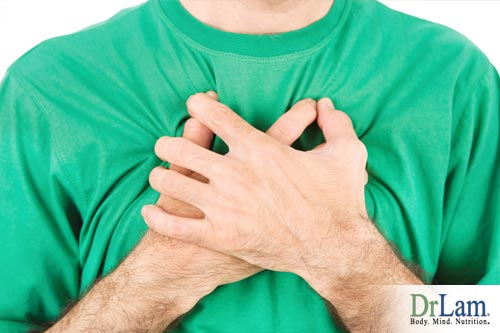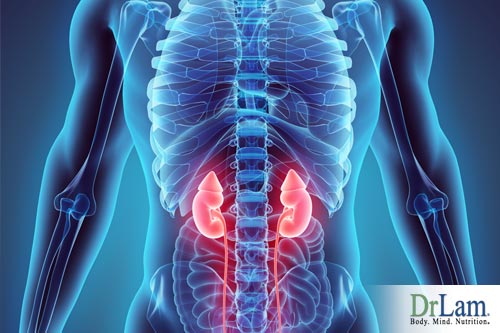
The adrenal glands are important to a vast amount of body functions. When they are not working properly, there may be a tremendous impact on how a person feels. The adrenal glands are linked to optimal function of four major organ systems: the heart, liver, kidneys, and digestive system, by producing regulating hormones. If these glands are not performing correctly, there is no other backup in the body that can produce the same level of hormones. If the adrenal glands become fatigued and hormone levels drop, these four areas of the body may be negatively impacted, generating a wide variety of symptoms including breathlessness causes. These are just some of the problems we help our clients solve in our nutritional coaching programs.
 One of the more unusual symptoms that can result from adrenal fatigue is shortness of breath, despite results of a physical exam indicating everything is normal, including lung and cardiac function. The patient may describe feeling as if they cannot take a full breath of air, particularly upon exertion or when experiencing high levels of stress. Commonly described as breathlessness, this phenomenon is very real and can come on after climbing a flight of steps. Most advanced AFS sufferers have at one time or another had such experience, though it could be transient, if they really pay attention. The more advance the adrenal weakness, the more pronounced this can be.
One of the more unusual symptoms that can result from adrenal fatigue is shortness of breath, despite results of a physical exam indicating everything is normal, including lung and cardiac function. The patient may describe feeling as if they cannot take a full breath of air, particularly upon exertion or when experiencing high levels of stress. Commonly described as breathlessness, this phenomenon is very real and can come on after climbing a flight of steps. Most advanced AFS sufferers have at one time or another had such experience, though it could be transient, if they really pay attention. The more advance the adrenal weakness, the more pronounced this can be.
Shortness of breath is one of the complaints that can land an individual in the emergency room and place them high on the priority list. The seriousness of this complaint is due to the more common potential causes - heart attack, heart failure, or pulmonary embolism. Complications of the heart or lungs are always cause for concern and immediate medical attention is warranted.
If there appears to be no physiological basis for any breathlessness causes, the patient may be sent home with a clean bill of health. Most likely, the problem will return and the patient will wind up demanding solutions from a puzzled physician. They may be given an emergency inhaler for temporary relief; but the problem will recur without a long-term solution.
Shortness of breath typically presents in two different situations related to adrenal fatigue. One occurs when an individual is extremely nervous with accompanying generalized anxiety. Having an episode of this heightened sense of nervousness, perhaps during a particularly frightful experience, can become one of the breathlessness causes. Being unable to take a full deep breath of air is typically associated with the symptoms of a panic attack when the person is breathing so quickly the breath volume on intake is shallow and rapid. When short, shallow breaths are taken in quick succession, it becomes nearly impossible to exhale completely, resulting in a buildup of carbon dioxide. This type of shortness of breath becomes cyclical, repeating itself, and is tied in to the release of norepinephrine and epinephrine (also called adrenaline) in the body. These hormones and neurotransmitters are released when the body is under stress, and stimulate many organs in the body, including the lungs. An increased heart rate, feelings of anxiousness, tinnitus, and shortness of breath are all unwanted side effects that can result from increasing levels of norepinephrine and epinephrine in the body.
In more advanced cases of adrenal fatigue, the client is in a catabolic state. At this point in the progression of adrenal fatigue, they have a decrease in muscle mass and are extremely lean. They have lost muscle mass in the larger muscle groups, such as the quadriceps and gluteal muscles. In addition, the muscles that hold the ribs together, the intercostal muscles, are also weak and diminishing. When a person in this condition attempts to take a deep breath, they find it difficult due to the wasting of the intercostal muscles and loss of muscle strength. When this happens, expansion of the ribcage cannot occur normally. At this point there is both a physical and structural compromise to the breathing action, and this lack of proper muscle strength becomes one of the more serious breathlessness causes. This situation is extremely rare and emergency medical attention may be required in these situations to ascertain that you are stable and able to breath on your own accord.
The right diet is absolutely essential for avoiding this frightening stage of adrenal fatigue, as many of our nutritional coaching clients have discovered.
 Another related problem that sometimes occurs, when the adrenal glands are not functioning up to capacity, is postural tachycardia syndrome (POTS). POTS is a type of orthostatic intolerance that occurs with rapid heart rate (typically over 120 beats per minute) and other symptoms, such as low blood pressure, when a person stands up from a sitting or lying down position. The corresponding symptoms experienced with postural tachycardia syndrome are so varied, in some individuals the blood pressure remains constant or even increases.
Another related problem that sometimes occurs, when the adrenal glands are not functioning up to capacity, is postural tachycardia syndrome (POTS). POTS is a type of orthostatic intolerance that occurs with rapid heart rate (typically over 120 beats per minute) and other symptoms, such as low blood pressure, when a person stands up from a sitting or lying down position. The corresponding symptoms experienced with postural tachycardia syndrome are so varied, in some individuals the blood pressure remains constant or even increases.
Additional clinical abnormalities that patients with POTS symptoms display may include low blood volume and high levels of norepinephrine while standing. Many people with postural tachycardia syndrome report feeling nauseated, fatigued, and lightheaded. Some experience heart palpitations, have difficulty concentrating, experience tremors, fainting spells, exercise intolerance, pain and coldness in extremities, shortness of breath and chest pain.
Symptoms of postural tachycardia syndrome can occur as a result of a number of different abnormalities. While some of the disorders linked to POTS symptoms are known, many of the underlying causes have yet to be identified. There are different types of POTS. In the setting of AFS, adrenergic driven POTS like symptoms are common. Most sufferers are symptomatic, but do not fit the classical definition of POTS, and tests are borderline or normal. They are usually given a clean bill of heath from the cardiologist and neurologist, while they remain clinically symptomatic. We called these subclinical POTS, where symptoms are present but laboratory test are normal.
The condition is further complicated due to the difficulty distinguishing between the cause and effects of the problem. Because there are many conditions that can produce POTS-like symptoms, it’s important that physicians seek to identify possible reasons for the syndrome, since many of the causes are reversible.
Shortness of breath is a symptom that, by itself, may not be an indicator for anything more serious. While the difficulty of breathing can often be a frightening and alarming, oxygen saturation levels are typically within normal limits and the body is not in any serious danger.
 When an individual complains of shortness of breath, and it appears that adrenal fatigue is part of the profile, the issue becomes determining whether the symptomatology is related to the progression of catabolism, or if there are other contributing factors. If postural tachycardia syndrome is an additional piece of the puzzle, the clinical profile may indicate larger issues that need addressing.
When an individual complains of shortness of breath, and it appears that adrenal fatigue is part of the profile, the issue becomes determining whether the symptomatology is related to the progression of catabolism, or if there are other contributing factors. If postural tachycardia syndrome is an additional piece of the puzzle, the clinical profile may indicate larger issues that need addressing.
Fortunately, if the adrenals are rebalanced and allowed to recover, the catabolic process can be reversed and hormones brought back into balance as well. This will improve the entire condition of the body. Catabolism, when left unchecked can be a significant contributor to breathlessness causes, which, when allowed to continue, may cause other serious structural problems due to lack of proper lung expansion. In addition, lack of a complete breathing cycle has been known to lead to infections, such as pneumonia.
As the adrenal glands return to normal, physical strength also returns. At this point, the body’s ability to self-regulate will be improved and controlling abnormal breathing during stressful situations will be easier. Normal functioning adrenal glands will be able to produce the necessary hormones to regulate other common body functions. It is important to note that by the time most people experience shortness of breath in an AFS setting, the condition is at an advanced stage. Self-navigation usually fails and in fact can worsen the condition if one is not careful. The use of adrenal support supplementation needs to be very judicious, as small amounts of supplements can trigger the body into an adrenal crash, and set the body off in a vicious cycle of worsening shortness of breath, ending in panic attack, or severe insomnia. If you suspect you are in such a situation, consulting an experienced, AFS literate, practitioner is best.
Shortness of breath can be a terrifying symptom, but it isn't always serious. There are many breathlessness causes, and most of them aren't serious or can be addressed. Once you’ve visited your doctor to identify any potentially dangerous causes, there are lots of things you can do to improve your symptoms.
One of the most impactful things you can do is to address your nutritional intake. Good nutrition is the fuel for your body and its functions, and this is precisely what we address in our nutritional coaching programs.
There are many different kinds of breathing exercise. Deep breathing or holding your breath between inhale and exhale can help to keep the mind clear. While the Adrenal Breathing Exercise helps to keep the body calm. If you have stage 1 or 2 AFS, it's good to practice both kinds of breathing.
They are very similar, with ABE, you should not go over 80% of lung capacity, and you don't want to hold your breath. The key is calming.